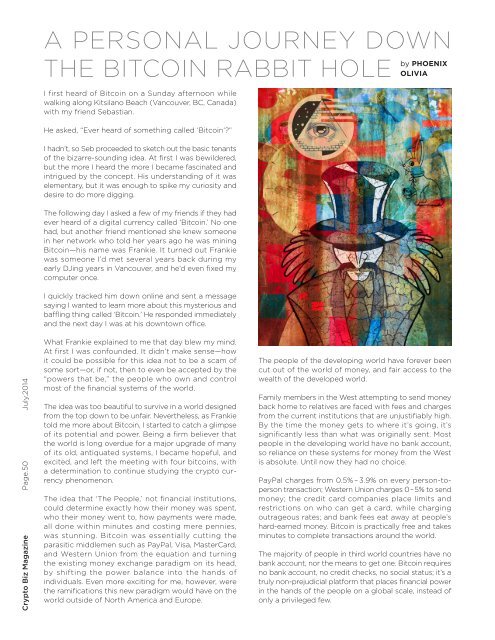Crypto Biz Magazine—July, 2014/Issue.02
Digital Currencies & Crypto Innovations—We observe and explore all aspects of the crypto world, including mining, financial trading, exchanges, development and business.
Digital Currencies & Crypto Innovations—We observe and explore all aspects of the crypto world, including mining, financial trading, exchanges, development and business.
You also want an ePaper? Increase the reach of your titles
YUMPU automatically turns print PDFs into web optimized ePapers that Google loves.
A PERSONAL JOURNEY DOWN<br />
by PHOENIX<br />
THE BITCOIN RABBIT HOLE OLIVIA<br />
I first heard of Bitcoin on a Sunday afternoon while<br />
walking along Kitsilano Beach (Vancouver, BC, Canada)<br />
with my friend Sebastian.<br />
He asked, “Ever heard of something called ‘Bitcoin’?”<br />
I hadn’t, so Seb proceeded to sketch out the basic tenants<br />
of the bizarre-sounding idea. At first I was bewildered,<br />
but the more I heard the more I became fascinated and<br />
intrigued by the concept. His understanding of it was<br />
elementary, but it was enough to spike my curiosity and<br />
desire to do more digging.<br />
The following day I asked a few of my friends if they had<br />
ever heard of a digital currency called ‘Bitcoin.’ No one<br />
had, but another friend mentioned she knew someone<br />
in her network who told her years ago he was mining<br />
Bitcoin—his name was Frankie. It turned out Frankie<br />
was someone I’d met several years back during my<br />
early DJing years in Vancouver, and he’d even fixed my<br />
computer once.<br />
I quickly tracked him down online and sent a message<br />
saying I wanted to learn more about this mysterious and<br />
baffling thing called ‘Bitcoin.’ He responded immediately<br />
and the next day I was at his downtown office.<br />
Page.50 July.<strong>2014</strong><br />
<strong>Crypto</strong> <strong>Biz</strong> Magazine<br />
What Frankie explained to me that day blew my mind.<br />
At first I was confounded. It didn’t make sense—how<br />
it could be possible for this idea not to be a scam of<br />
some sort—or, if not, then to even be accepted by the<br />
“powers that be,” the people who own and control<br />
most of the financial systems of the world.<br />
The idea was too beautiful to survive in a world designed<br />
from the top down to be unfair. Nevertheless, as Frankie<br />
told me more about Bitcoin, I started to catch a glimpse<br />
of its potential and power. Being a firm believer that<br />
the world is long overdue for a major upgrade of many<br />
of its old, antiquated systems, I became hopeful, and<br />
excited, and left the meeting with four bitcoins, with<br />
a determination to continue studying the crypto cur -<br />
rency phenomenon.<br />
The idea that ‘The People,’ not financial institutions,<br />
could determine exactly how their money was spent,<br />
who their money went to, how payments were made,<br />
all done within minutes and costing mere pennies,<br />
was stunning. Bitcoin was essentially cutting the<br />
parasitic middlemen such as PayPal, Visa, MasterCard,<br />
and Western Union from the equation and turning<br />
the existing money exchange paradigm on its head,<br />
by shifting the power balance into the hands of<br />
individuals. Even more exciting for me, however, were<br />
the ramifications this new paradigm would have on the<br />
world outside of North America and Europe.<br />
The people of the developing world have forever been<br />
cut out of the world of money, and fair access to the<br />
wealth of the developed world.<br />
Family members in the West attempting to send money<br />
back home to relatives are faced with fees and charges<br />
from the current institutions that are unjustifiably high.<br />
By the time the money gets to where it’s going, it’s<br />
significantly less than what was originally sent. Most<br />
people in the developing world have no bank account,<br />
so reliance on these systems for money from the West<br />
is absolute. Until now they had no choice.<br />
PayPal charges from 0.5% – 3.9% on every person-toperson<br />
transaction; Western Union charges 0 – 5% to send<br />
money; the credit card companies place limits and<br />
restrictions on who can get a card, while charging<br />
outrageous rates; and bank fees eat away at people’s<br />
hard-earned money. Bitcoin is practically free and takes<br />
minutes to complete transactions around the world.<br />
The majority of people in third world countries have no<br />
bank account, nor the means to get one. Bitcoin requires<br />
no bank account, no credit checks, no social status; it’s a<br />
truly non-prejudicial platform that places financial power<br />
in the hands of the people on a global scale, instead of<br />
only a privileged few.


